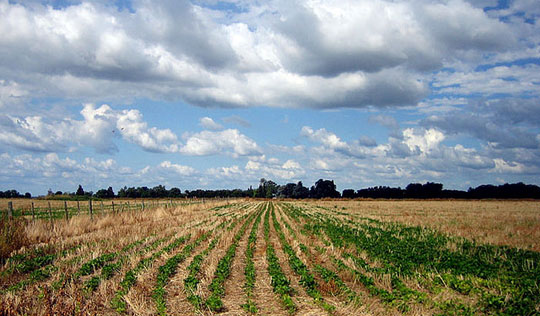A new series of Debates on Sustainability and Development in Latin America has kicked off in Argentina with a discussion on the social utility of publicly funded research for transgenic crops. Organised by two of the STEPS Centre’s partner institutions, El Centro de Investigaciones para la Transformación(Cenit), and El Instituto de Estudios sobre la Ciencia y la Tecnología de la Universidad Nacional de Quilmes (UNQ), the series has been launched as we move towards establishing a Latin American ‘Sustainability Hub’for collaborative, interdisciplinary work, as part of a new global STEPS Centre network.
We will be inviting speakers to discuss issues that are central to the development agenda of many Latin American countries: from the implications of state investment in shale oil and gas for long-term energy strategy; to how different ways of protecting intellectual property affect the nature and direction of local innovation; to the prospects for creating more resilient, inclusive and sustainable natural resource-based industries, to what ‘innovation for social inclusion’ does and could mean in practice. The seminar series will be an important first step in discussing, debating and developing some of the themes that will become the research focus for the Sustainability Hub, and for creating a wider network of Latin American academics interested in those themes.
A key purpose of the future Hub will be to bring to the fore alternative visions and experiences of what sustainable and inclusive development might mean in the region. In a context where relatively high levels of economic growth in recent years have done little to shift many long standing problems, from massive specialization in primary production, to unacceptable distributions of income and wealth, and where a host of newer sustainability challenges are emerging, we think there is an urgent need to examine existing models and directions of development. We will be bringing an explicit pathways perspective to bear on work within the Hub, and at the same time we want to help ensure that Latin American ideas about sustainability, whether originating in civil society initiatives, or from innovative parts of government and the private sector, enrich thinking elsewhere on this issue.
Our first debate, held on 6 May at the Centro Cultural Borges in Buenos Aires, asked:What is the social utility of publicly funded R&D for transgenic crops? In wider debates about transgenic agriculture, many analysts defend state support for the technology on the grounds that transgenesis represents the future for seed innovation; one that the State ought to be more centrally involved in supporting, and even directing and benefiting from. In part this rests on the widespread view that transgenesis has already been a key technology driving agricultural productivity growth in countries such as Argentina, where the technology has been in commercial use for nearly two decades, and on part on expectations that there will be very substantial benefits in the future.

Soja en Siembra Directa by venadotuerto (Flickr)
We proposed this debate in the light of work at Cenit which suggests that conventional seed breeding (aided by advanced genomics) has had a far greater impact, thus far, than transgenic seed innovations on soya productivity growth in Argentina, and because there exist a less optimistic (and also less powerfully articulated) set of expectations about transgenic agriculture: of the crowding out of conventional seed breeding; of a seed sector in which domestic seed firms and the state have little presence; of reduced capacity to support smaller farmers; of fewer incentives to improve crops that do not have large commercial export markets; and of potential impacts on health and biodiversity for which there is little funding for local scientific investigation.
We invited speakers that represented both sides of that debate, and a summary of that discussion can be found on the Cenit website, with some of the themes also picked up in this article in the Argentinean newspaper Pagina/12.
A key aim in this and future debates, is to make explicit the models of development, understandings and visions that accompany dominant pathways of socio-technological change, and to open up space to explore alternative options. Over the coming weeks we will establish a new website where reports on our seminars, video of the debates, and other commentary will be available. Watch this space!
by Valeria Arza, Mariano Fressoli, Anabel Marin and Patrick van Zwanenberg, STEPS Centre Latin American hub
